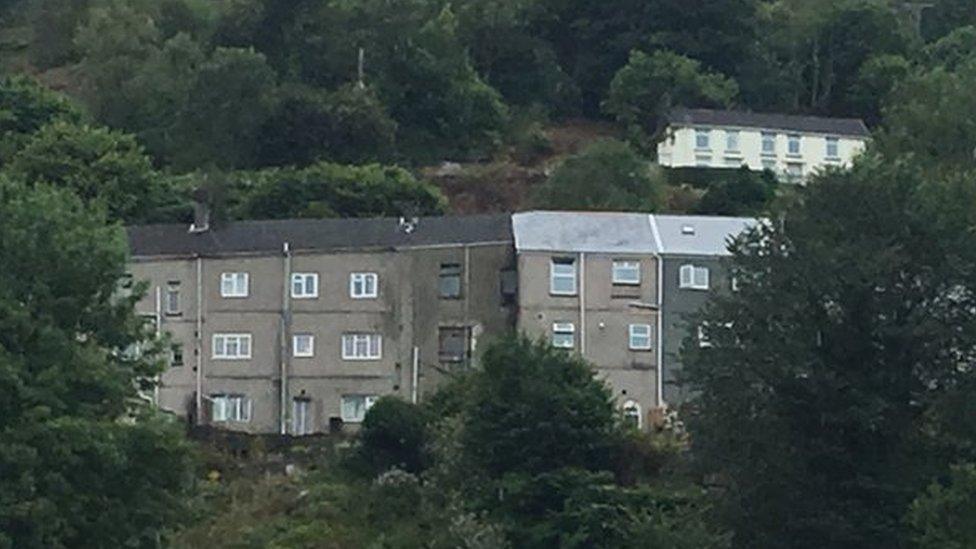Swansea Valley landslides: Living on a 'moving mountain'
- Published
Landslides are part of life for some residents living in the Swansea Valley
Hidden from sight by the undergrowth is a road. It used to be well travelled but not anymore. Beyond it is a "lost village".
It was once the main road through the village of Pantyffynnon, 13 miles north of Swansea. Now it's just a footpath.
Sixty years ago landslides from the hill the village was built on destroyed some of the homes and engulfed the road. Nobody was killed but the villagers were forced to leave.
It is a constant reminder for people living in communities nearby that their houses, schools and businesses are also built on ground that has a habit of moving.
Residents of neighbouring Pantteg, Godre'r Graig and Ystalyfera are used to landslides from the hillside, made up of hard sandstone sitting above softer rock and old mine workings.
There have been some landslides from the hillside above some Swansea Valley villages
Living under the threat of a landslide is nothing new for people in the area. Maps from the 1800s show the problem was known about then. There were issues in the 1940s, 1950s and 1960s. In 1986 six houses were affected by another landslide, with residents evacuated.
The issues facing the area continue to be well documented. In July, a primary school was forced to close due to the risk of a landslide from quarry spoil on the hillside above.
In December 2012, thousands of tonnes of soil and rock struck Pantteg, forcing people to leave their homes.
And in 2017, the residents of 10 homes on Cyfyng Road were told they had to leave because of the possibility their houses could collapse.
So you might think people living here keep a fearful eye on what has become known as the "moving mountain" - a hill called Mynydd Allt-y-grug. Far from it.
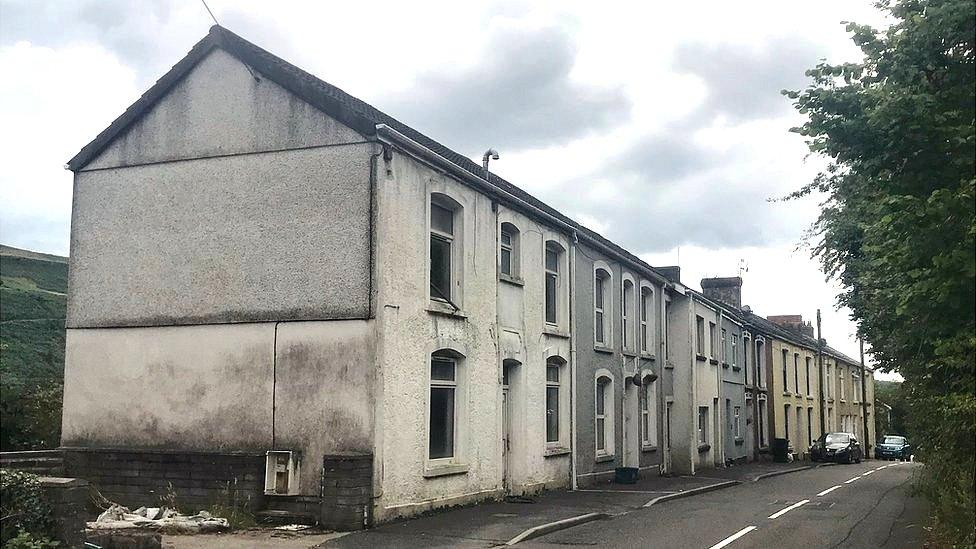
Houses in Cyfyng Road in Pantteg which residents have been forced to leave due to the risk of landslides
'Creaks and groans'
Chris Jones lives just a few metres from where Pantyffynnon once stood. He moved in well aware of the history.
"I've know about it all my life," he said. "It gets over-egged in the press to make it into a drama.
"If you walk through the countryside there's risks everywhere. I've worked in construction and I've seen brand new houses that have been pulled down after 25 years because they were sub standard.
"My house was built around 1850. Now there's a few leaning walls and things like that but you show me a 160-70 year old house that hasn't got a few creaks and groans in it.
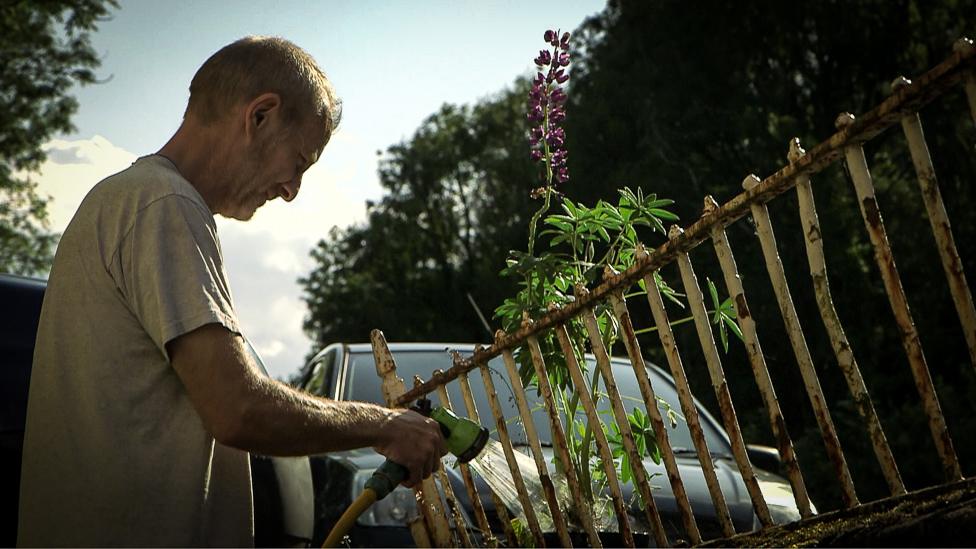
Chris Jones at his home close to the "lost village" of Pantyffynnon
"When people were moved out of their houses [on Cyfyng Road] last year, a lot of them didn't want to go because they were comfortable with the risk.
"It's wonderful. I love living here. People don't dwell on it [the moving mountain]. If you did, you wouldn't live here."
Walk into the local pubs or stop people for a chat on the high street and you'll hear this view a lot. But for some it is hard to be so philosophical.
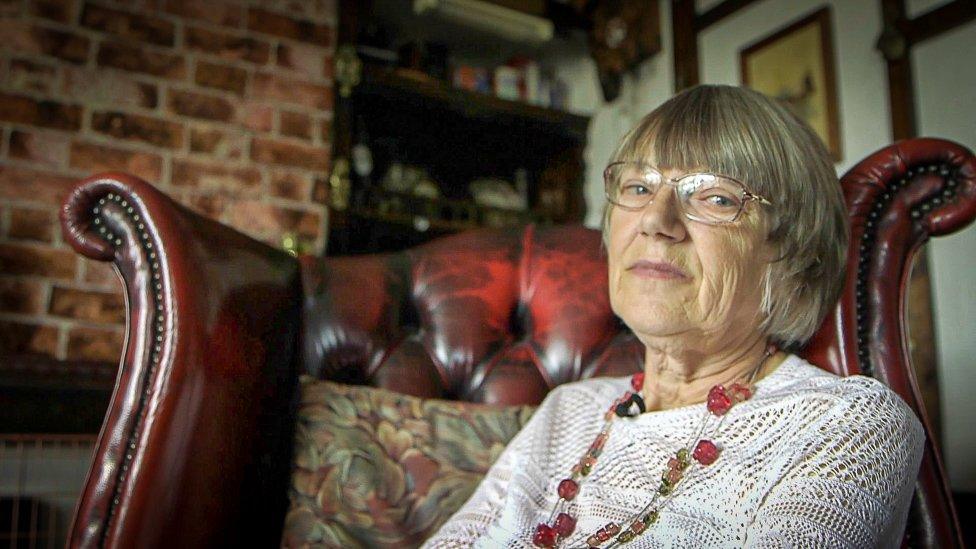
Val Trevallion had to pack her family's belongings in bin bags and flee when a landslide threatened her home. They were never able to return
Seven hours to flee
Val Trevallion's dream to live in a cottage in the area came true - then turned into a nightmare.
The first time she laid her eyes on Penygraig House in Ystalyfera, she felt she had "come home". She and husband Peter bought it within six weeks.
A year later, just before Christmas 1986, the couple heard water rushing down the hillside and soon nearby houses were being evacuated. Val and Pete thought all would be fine as their house was built on bedrock.
But then two surveyors appeared in the garden, and Val and Pete's dream began to disintegrate.
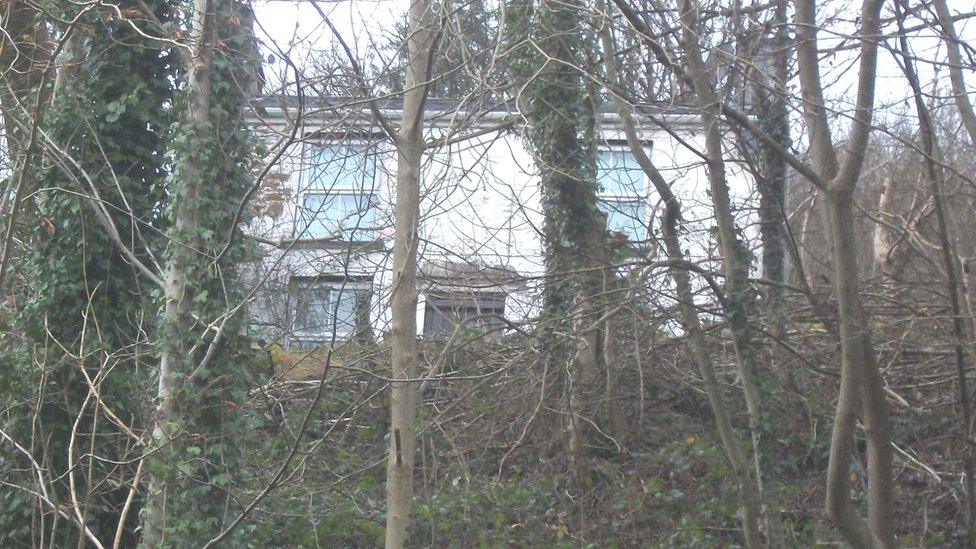
Val Trevallion's home before it was demolished
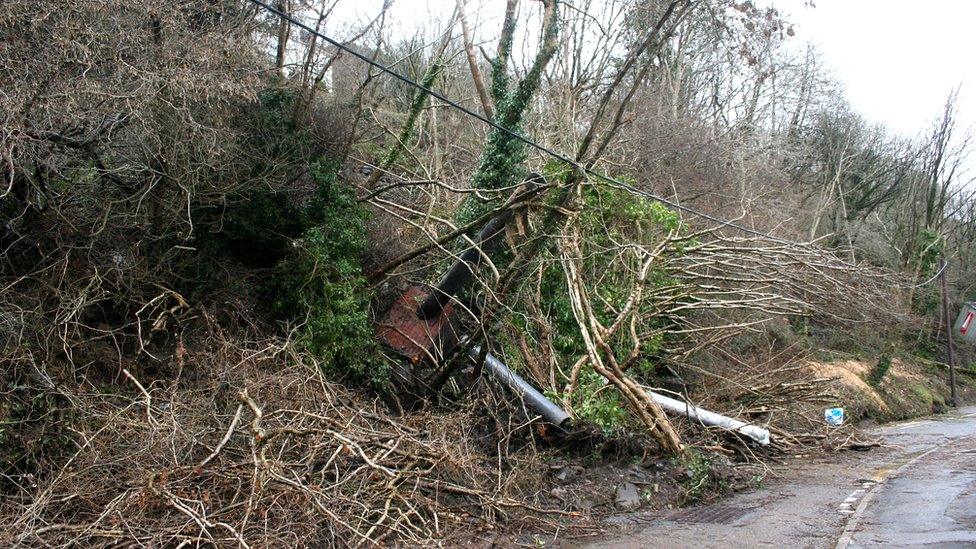
A landslide in 2012, with Val Trevallion's house visible at the top left
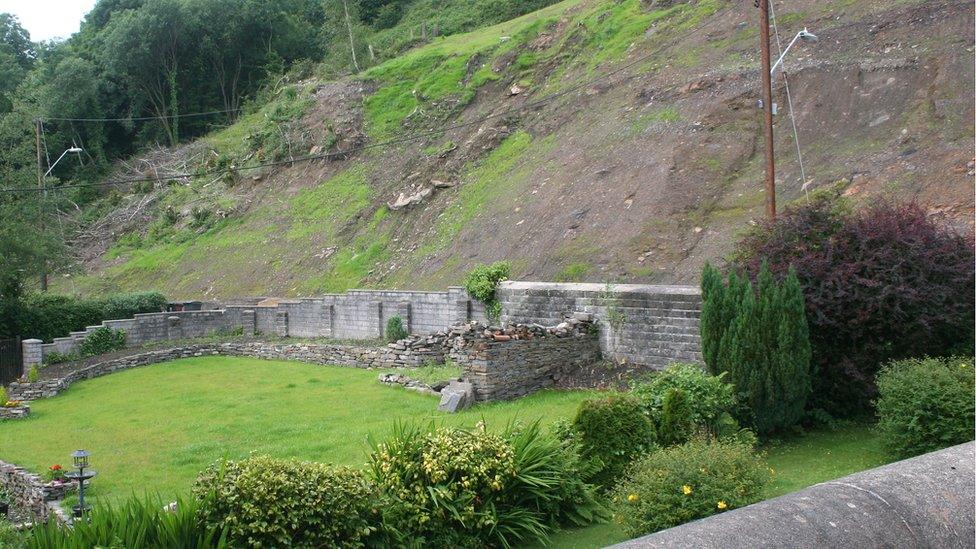
What is now left of Val Trevallion's home, which was abandoned in 1986 due to landslide fears
"They said we had seven hours to get out, that the house was going to break its back."
Val, Peter and their four children - one of them just six months old - stuffed their possessions into seven black bags and, with the help of neighbours, moved out. They were given the keys to another house where they assumed they would live for a few months. They have been there ever since.
Val and Pete's house actually stood for 30 years before being demolished after a major landslide in 2012. The couple say they were told there would be no insurance payout because the landslide was an "act of God".
They have rebuilt their lives, but it has taken its toll.
"I didn't stop crying for a long time. I was drained," said Val.
"You need acceptance to live here. What will be, will be."
Mining impact
Despite the regular landslides in this area, there are no records of anyone being killed by such an event. Experts think that has only been by chance.
In 2016, engineering and geology experts at Earth Science Partnership produced a report, external for Neath Port Talbot Borough Council about the landslip area. Their conclusion was that developing an early warning system for future landslides, rather than trying to stabilise the land, would be the the best approach.
Tellingly, their summary contains this line: "No incidents of loss of life have been recorded over time; however we believe that this was only narrowly avoided on a number of occasions."
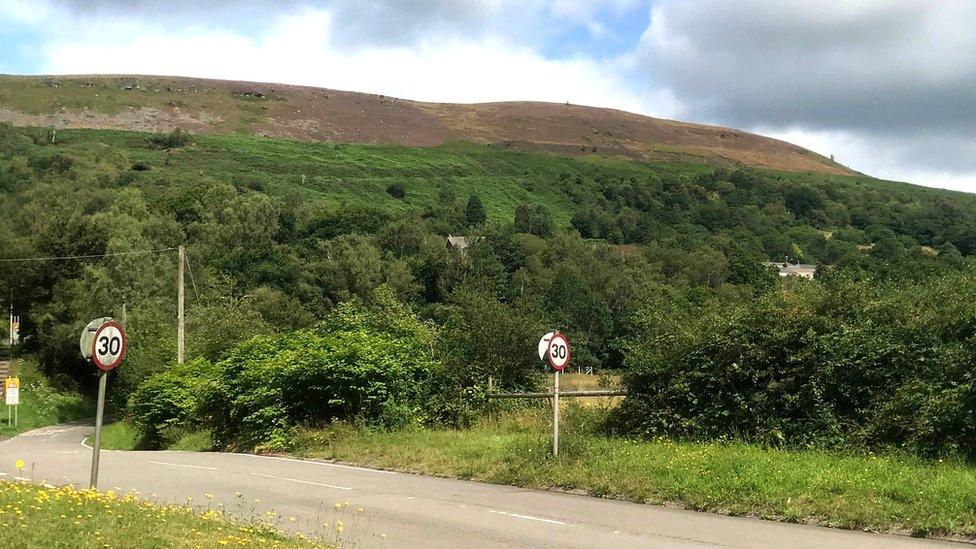
The "two tone" landscape above Ystalyfera with hard sandstone at the top and vegetation growing on the softer layers
Neath Port Talbot County Borough Council said: "Monitoring is ongoing and further targeted investigation is planned. There is a potential that provided the links between rainfall, river flow and instability can be investigated and monitored over time (medium to long term), a trigger or threshold could be developed for the landslide."
So what does the future hold? According to Dr Tristram Hales, senior lecturer in geomorphology at Cardiff University, while some factors are out of our control, human activity has had, and will continue to have, an impact in this area.
"There are a number of different processes at work which have created this landslide but the biggest is the fact that coal was found there," he said. "It not only transformed the landscape beneath the surface but it also changed the way water moves.
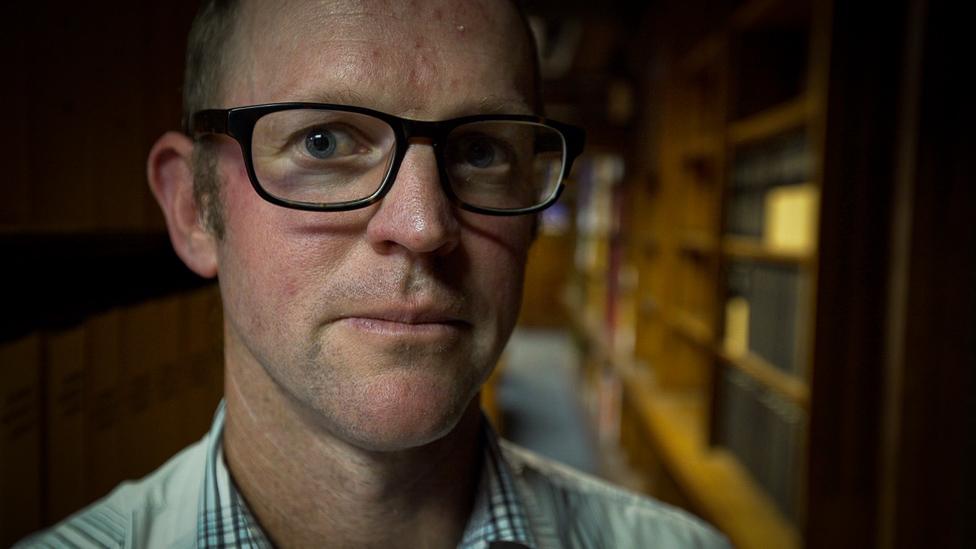
Landslide expert Dr Tristram Hales
"If you look at a lot of the major events which have happened here, they're often preceded by storms or heavy rainfall.
"How we as humans choose to live in places like Ystalyfera is key to the future. If we build more houses or add drains, that will change the conditions of the landscape."
For those who continue to call the area their home, it seems it is a risk they are prepared to live with.
- Published26 December 2012
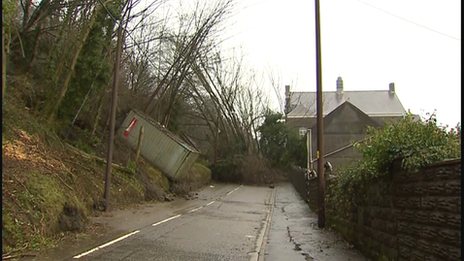
- Published15 March 2019

- Published23 August 2017
